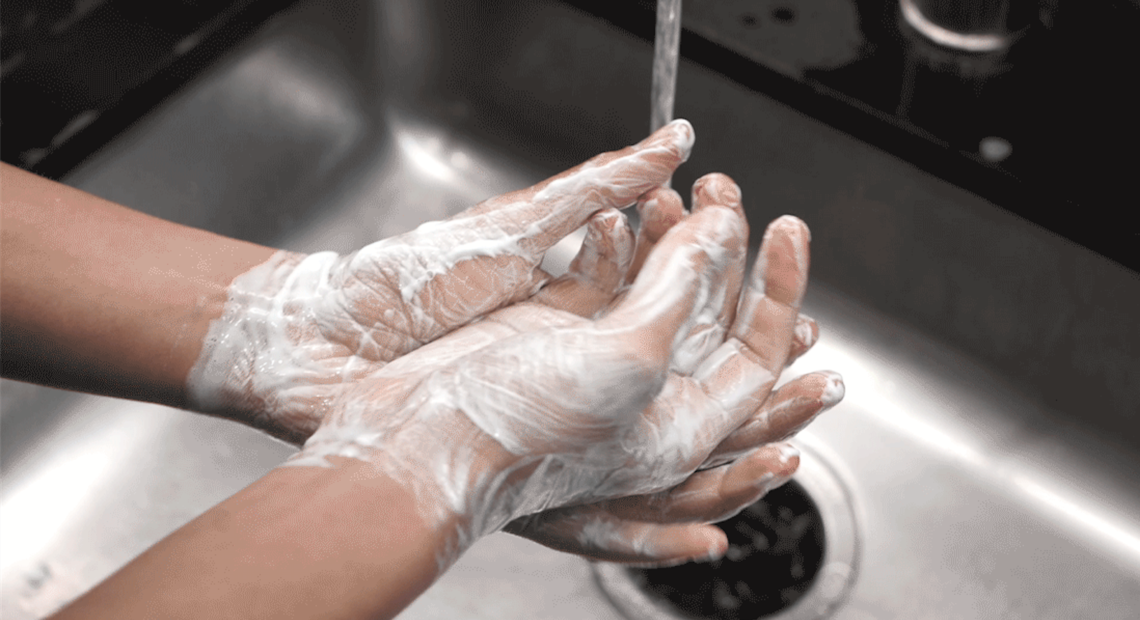
What You Might Not Realize About The Benefits Of Hand-Washing
PHOTO- Credit: Jay Reed/NPR
BY MARC SILVER
OK, so maybe you’re one of those people who don’t wash their hands even after going to the bathroom because your dad never did and he never got sick.
Or you think a three-second hand scrub is more than enough.
Or you squirt on some hand-sanitizer and figure you’ve done your duty.
I have some news for you.
There’s a new study out on norovirus and the role hand-washing can play in stopping an outbreak.
To sum it up: Wash up!
Norovirus is responsible for roughly 1 in 5 cases worldwide of acute gastroenteritis. The symptoms are pretty horrible: nausea, vomiting and diarrhea. And it’s very, very, very contagious. It takes only one particle to infect a human, compared to roughly 50 to 100 particles of flu virus.
In countries with good health-care systems, a norovirus victim will have about three days of misery but likely recover. But for young children and the elderly, especially in developing countries, the prognosis can be grim. The Centers for Disease Control and Prevention estimates that 50,000 children a year, under age 5, die from norovirus, mainly in lower-income countries.
The virus is particularly effective at finding victims in crowded places: hospitals, schools … and cruise ships, where everybody is living, eating and sharing activities in the same spaces.
Researcher Sherry Towers became curious about norovirus after contracting a case herself. She believes she got it by using a bathroom in which someone had … barfed. She thought the facility had been adequately cleaned. (Only apparently not.)
Towers, a professor at the Simon A. Levin Mathematical, Computational and Modeling Sciences Center at Arizona State University, decided to construct a mathematical model, using data from an actual norovirus outbreak in the early 2000s aboard a cruise ship. She “tweaked the parameters” to see what might have been the most effective way to intervene: quarantining patients, cleaning up the “environment” or hand-washing. The study published on Tuesday in Royal Society Open Science.
Quarantining wouldn’t be all that helpful, Towers and her collaborators concluded. Some people who contract norovirus have mild symptoms and don’t bother to report them — or may show no symptoms at all. But they can still spread the disease.
The strategy of wiping down surfaces with a chlorine-bleach solution does have an impact. But in the model, it only reduced the outbreak size by 10 percent, says Towers: “It’s easy to miss an area and you can’t wash all surfaces — like a carpeted surface — with chlorine bleach.” And because person-to-person is the dominant way the virus spreads, even a thorough cleaning can’t stop transmission when people engage in ordinary activities like shaking hands. If you then touch your face, virus particles can gain entree to your body via the eyes, nose or mouth.
But oh my goodness, washing hands was nearly magical. If 80 percent of the cruise ship passengers who did not wash their hands were to change their hygiene habits, the outbreak would be halted.
But here’s the rub-a-dub-dub. “You can’t force people to wash their hands,” says Towers. And a lot of people don’t do it.
“This is going to sound gross,” says Dr. Mark Gendreau, the chief medical officer for Beverly and Addison Gilbert Hospitals in Massachusetts, “but [in some countries] 50 percent or more of the population never washes their hands after going to the bathroom. That’s number 1 and number 2.” (FYI, men tend to be more lax than women.)
Even if you do wash, you may be doing a slipshod job. Hand-washing gurus say you need to devote 20 seconds to the task. But one survey found that only 5 percent of subjects washed for 15 seconds or more.
Then there are the details to master: Wet hands first, then add soap because you’ll get a better lather that way, which is key to breaking down the norovirus, says Gendreau. Alcohol-based gel sanitizers aren’t as effective in breaking down norovirus particles because soap itself “dismantles the proteins on the virus itself,” he says. “The gel won’t do that effectively but there’s going to be some benefit by rubbing your hands.”
The problem in poor countries, says Towers, is that the water supply itself may be contaminated. Even if the water is okay, Gendreau points out that there may not be a custom of washing after going to the toilet or before eating. Getting everyone in the world to practice hand hygiene is the goal of Global Handwashing Day, an October 15 event.
As for people who believe that it’s good to expose your body to microbes, Gendreau notes there is no evidence that norovirus particles bring benefits. The microbiome of your skin — the bacteria that can help keep you healthy — exists about five layers down from the surface. Norovirus particles sit on the surface of your skin and “don’t get into the microbiome,” he says. But they are potentially risky to your health when you touch your face as you do (on average) … 200 … times … a … day.
Not that I’m paranoid or anything, but now I’m going to go wash my hands. With soap.















